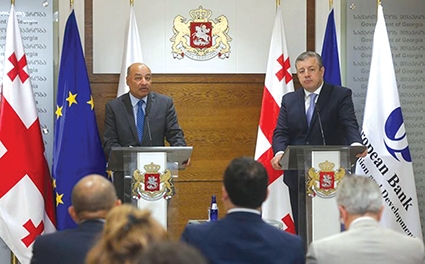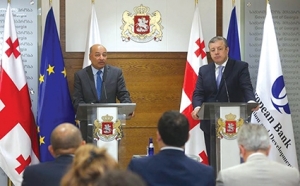Georgian Government Officials Meet with EBRD President
Prime Minister of Georgia Giorgi Kvirikashvili met with Suma Chakrabarti, President of European Bank for Reconstruction and Development (EBRD), during his two-day visit to Georgia this Wednesday, in order to discuss the 25 years of successful cooperation between Georgia and the European Bank for Reconstruction and Development, with the Four Point Reform Plan initiated by the Government of Georgia being the main focus of the meeting.
Kvirikashvili thanked the EBRD President for his continued support, through which more than 200 projects have been initiated in Georgia, amounting to almost €3 billion of investment.
To date, the Bank says it has invested a total of €2.8 billion for 205 projects in the Georgian economy.
When the PM of Georgia and the EBRD President met, they talked about the strategy of EBRD in Georgia, supporting the government’s Four Point Plan, which entails educational, spatial development and governance system reforms. Georgia’s progress in institutional and structural reforms was also discussed, with the PM highlighting the capital market and upcoming pension reforms, with the latter to come into force from the third quarter of 2018, with necessary legislative, technical and institutional infrastructure being prepared.
Kvirikashvili pointed out the importance of EBRD issuing the first ever bond in local Georgian currency, which is said to be assisting the economic growth of the country, and encouraging investments. He added the EBRD is actively implementing innovative products within the Georgian economy.
“EBRD is one of the key partners of Georgia, counting 25 years of successful partnership with our country, with over 200 projects financed and approximately three billion Euros invested, which truly is an unprecedented partnership with international financial institutions for Georgia,” the PM said, going on to mention the projects financed by the EBRD in the energy sector, municipal infrastructure, and the investments in the country’s private sector.
Kvirikashvili also highlighted the importance of EBRD's support to Georgia in the Euro-integration process and the DCFTA support program, which enabled Georgian banks to finance businesses in local Georgian currency. Kvirikashvili then underlined the support EBRD provides within the economic reforms in the country.
The parties also talked about the work of the Investor’s Council, a platform established by EBRD and the Government of Georgia in 2015, during the EBRD annual meeting held in Tbilisi. Chakrabarti attended this meeting while on his recent visit to Georgia.
The EBRD President expressed satisfaction about the productive and successful meetings they had held with the Government of Georgia.
"What we could sense is a joint determination to work towards further improving Georgia’s economic performance. This is also illustrated in the EBRD’s high volume of investments,” he said, adding the relations between the EBRD and Georgia is “really a benchmark”.
“I strongly believe that where we are now with Georgia makes this country very much the leader of the next wave of transition countries,” which, he said, is due to “very good economic management”.
“I’m pretty sure that our forecast for this year, which is about 3.8%, will be beaten, and I think Georgia will grow beyond 4% next year. We’ll have new forecasts in November to share with you, but I’m sure Georgia will be growing very, very fast,” he said.
The President of EBRD emphasized the work of the Georgian government with the private sector, with the international institutions including EBRD, with the Investors Council, to encourage the reforms to the business climate in the country.
“I’m really pleased to see how Georgia has moved up in all the international rankings in the last five years,” he said, noting that the context allowed EBRD to invest more, seeing a record year in 2016, with the financing of 17 projects for €250 million, with €80 million investments in a wide range of private sector projects, healthcare, agribusiness, telecommunications, property and tourism, and in the power energy sector which launched the wind farm in Gori, which is the very first in the Caucasus region.
The EBRD President also mentioned the infrastructure, municipal and transport sector projects financed, and in the financial sector, the DCFTA facility signed and launched together with the Bank of Georgia and TBC; which, according to Chakrabarti, will help Georgian SMEs to reach EU standards.
“We’ve signed probably the most exciting country strategies, approved by our board last December. It has four main elements to it, all of which are very, very important; our aim is to make the Georgian private sector as competitive as possible. We want to do more in local currency landing, on capital market development. We want to help Georgia to take advantage of its geographical position, its international connectivity,” Chakrabarti said.
“As I've always said, I think sometimes it’s quite fortunate that Georgia is not an oil and gas country, as that brings lots of pressure, but it has water and you need to maximize water as an economic resource,” he told those present, which included the Prime Minister, Minister of Finance and Deputy Prime Minister Dimitry Kumsishvili, Minister of Economy Giorgi Gakharia, Minister of Justice Tea Tsulukiani and Minister of Energy Ilia Eloshvili.
Nino Gugunishvili












